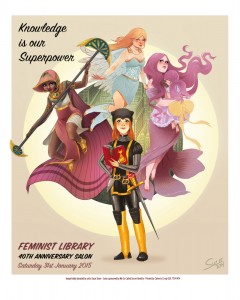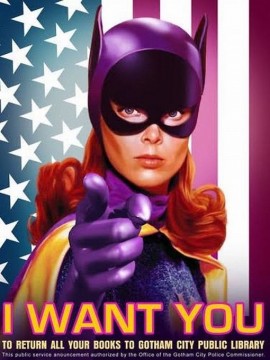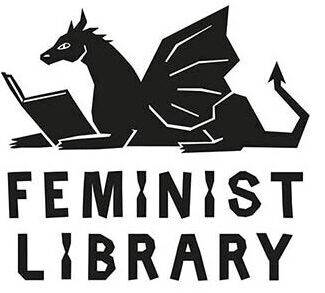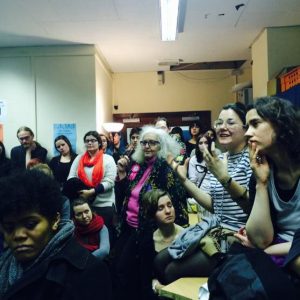Feminism and Libraries: Knowledge is our Superpower
The Feminist Library held its first salon of 2015 on Saturday (31st January). This year our salons are celebrating the library’s 40th anniversary with each monthly salon themed around a different section of our unique cataloguing system to highlight our collection.

My So Called Secret Identity
Will Brooker spoke about the original cool librarian – Batgirl! The sexist representation of Batgirl, and women in general in mainstream comics, inspired Will Brooker, Sarah Zaidan and Suze Shore to produce My So Called Secret Identity (MSCSI). MSCSI is based on the life of Cat, a girl just like you and me, who happens to live in a city of super heroes. However, Cat is the smartest girl in her city, but has been taught to keep herself to herself- perhaps they will take more notice of her in her costume!

Next on the itinerary was a discussion to talk about feminism in the context of libraries. We set the discussion around 4 discussion points. This was an open discussion, led by a panel, but the attendees were encouraged to contribute and ask questions at any time. The panel was made up of volunteers from the feminist library; Yasmin Ahmed, Eleanor Shaw and Emma Hughes, representatives from the Radical Librarians Collection- Anna Brynolf and Neasa Malone, Claire Hayward- a PhD at Kingston University and Will Brooker.
Feminism and libraries
We discussed what necessitates the need for a feminist library. Thoughts included the restrictions that might be placed on collection development if housed within another institution. The Feminist Library houses a lot of self-published material which, if in a library covering many topic areas, we may not be able to collect. We also felt it was important that the library isn’t just about the collection, but the space and the people you meet through it.
Classification systems
In 1979 the Feminist Library created its own classification system in response to the sexism displayed in other classification systems such as Dewey. We discussed how all classification systems are products of their time and influenced by the cultural and social discourses that surround the makers and users of the system and therefore there may never be an all-inclusive classification system. However, the structure of classification systems such as Library of Congress (LOC) are not suitable from feminist values, for example, LOC has categories for ‘Women as Accountants’ but no ‘Men as Accountants’. LGBT groups can be found segregated by gender or class, which would probably not be conducive to browsing in our library. This is why we felt it important to create our own. We also discussed the difficulties of updating a well-established classification system and why it is not always possible, but that you can avoid using the controversial categories!
What do you expect to see from the feminist library collection?
Owing to the time it was started, the Feminist Library is currently more focused on the second wave of feminism. However, we are slowly but surely updating the collection, but rely heavily on donations from individuals and publishers to do so. This was an opportunity for visitors new and old to tell us what they would like to see from the collection. People expressed an interest in seeing more books addressing intersectionality and an expansion on foreign language books and we hope to do this. We are very lucky to have a very unique collection of periodicals which do reflect these areas well.
We were really pleased with the turn out and stimulating discussion that was had. We hope that everyone had a good time and that those new to the Feminist Library will come back soon. We are currently in a position of looking to move to a new building, due to a rent increases in our current location. If anyone would like to donate, you can do so via our website. If you cannot afford to donate to us, but would like to help out, we are always looking for new volunteers so if you are interested please contact us: admin@feministlibrary.co.uk
Find out more about the Feminist Library here


